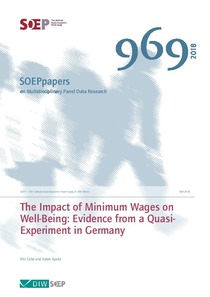The impact of minimum wages on well-being: evidence from a quasi-experiment in Germany

Deutsches Institut für Wirtschaftsforschung, Berlin
DIW - Berlin
2018
45 p.
minimum wage ; well being ; quality of life
SOEPpapers on Multidisciplinary Panel Data Research
969
Wages and wage payment systems
English
Bibliogr.
"To analyze well-being effects of minimum wages, the introduction of a minimum wage in Germany in 2015 is used as a quasi-experiment. Based on the representative SOEP data, a difference-in-differences design compares the development of life, job, and pay satisfaction between those who are affected by the reform according to their pre-intervention wages and those who already have marginally higher wages so that they are not directly affected. The results show that the minimum wage has significantly positive effects on all considered dimensions of well-being, on average, with an increase in life satisfaction by 0.10 standard deviations (0.15 points on a ten-point Likert scale). Positive effects last at least until one year after the reform. Life satisfaction tends to increase particularly in the region that is overall economically less developed (East Germany). The results hold if those who are not employed anymore after the reform are included in the analysis."
Digital
The ETUI is co-funded by the European Union. Views and opinions expressed are however those of the author(s) only and do not necessarily reflect those of the European Union or the ETUI.